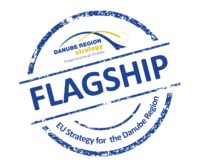Project, process, network; ongoing
EUSDR Priority Area(s): PA 2 Sustainable Energy
The collective and citizen-driven energy actions are key elements of the energy transition, however less widespread in the Danube Region, especially in its eastern part. The Danube Strategy Flagship covers activities that address various technical and socioeconomic aspects of creating appropriate conditions for renewable energy communities in the Danube Region. A special emphasis is put on renewable electricity generation as a cornerstone of energy communities, as well as issues of related infrastructure (grid expansion, grid balancing, and associated energy storage solutions), but also deals with awareness raising on the benefits of such initiatives.
The Danube Strategy Flagship will enable the spread of comprehensive systems, such as e.g. the “European Energy Award” that facilitate the daily operation work of local authorities in their municipal energy planning, but also methods from other initiatives and related projects that support the setup of new and the expansion of existing energy communities in a broader sense, to assist municipalities to elaborate their Sustainable Energy and Climate Action Plans (SECAP-s), enforce them joining the Covenant of Mayors, harmonise local policies to national and EU strategies, facilitate capacity building and benchmarking, etc.
Objectives: The Flagship activities (existing and future projects, knowledge sharing, development of municipal and expert networks) aim to coordinate and support local, citizen-driven energy actions in the Danube Region to enhance a clean energy transition and fight against energy poverty, thereby addressing Action 1 and Action 6 of the EUSDR Action Plan.
Need and (expected) impact: The collective and citizen-driven energy actions that help pave the way for a clean energy transition at local levels have an increasing importance in Europe. They contribute to the growing public acceptance of renewable energy projects and make it easier to attract private investments. At the same time, they have the potential to provide direct benefits to citizens by increasing energy efficiency, lowering their energy bills, and creating local job opportunities. Nevertheless, these initiatives are less common in the Danube Region, especially in its eastern part, where energy poverty is a main hurdle.
The Flagship activities are expected to contribute to a better developed and more energy-conscious society in the Danube Region, with a higher number of municipalities adopting smart energy planning and management and monitoring systems as well as participating in relevant EU networks (e.g. Covenant of Mayors, Energy Communities, EEA, etc.) and fewer areas affected by energy poverty.
Macro-regional dimension: All EUSDR countries are cooperating and the expected impacts are relevant to all cooperating countries.
Stakeholders involved: Policymakers and authorities at national, regional (municipal), and local level, energy and climate agencies, energy suppliers, NGOs, and engaged organisations and citizens.
Budget and Funding: Flagship projects with their own budgets (potential sources: Interreg Programmes, European City Facility Program).
Flagship other process/network activities: est. EUR 10 000/year (source: DRP – PAC – PA 2, PA 2 Energy project)
Contact: Ms Zsuzsa Bálintné Vörös, Priority Area Coordination Team, PA 2, Ministry of Foreign Affairs and Trade Hungary, zsvoros@mfa.gov.hu


